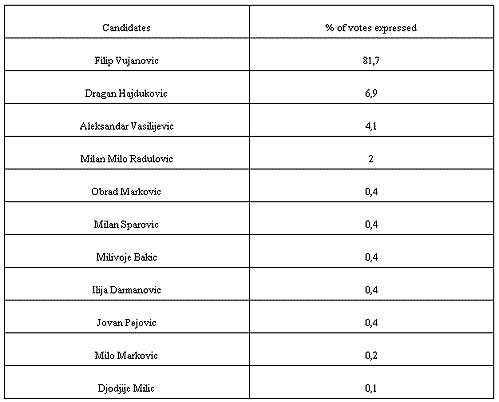Results
News
Corinne Deloy,
Fondation Robert Schuman,
Helen Levy
-

Available versions :
EN

Corinne Deloy
Fondation Robert Schuman
Helen Levy
The presidential election on 9th February was invalidated once more due to a participation rate lower than the 50% minimum of the electorate required by the Constitution. Just over a month after the previous election that had already been invalidated for a similar reason the Montenegrins are still without an elected President and will certainly be asked to vote again within the next few months after a change in the voting system. Indeed the minimum threshold that is in force at present is due to be abolished by a vote in Parliament in the near future.
47.4% of Montenegrins turned out to elect their President on Sunday i.e. 1,5 points more than during the previous election on 22nd December 2002 which produced a result that had already been predicted by the pollsters. The candidate for the ruling coalition, that brings together the Democratic Party of Socialists (DPS) and the Social Democrat Party (SDP), Filip Vujanovic, the movement's Vice President and right hand man to the new Prime Minister (and former President of the Republic) Milo Djukanovic, took a wide majority in the election winning 81.7% of the vote, far ahead of his ten adversaries (the candidate who took second place, Dragan Hajdukovic, only won 6.9% of the vote). The election was organised around the same 11 candidates that took part in the election on 22nd December and according to the same electoral roles. As in the previous election the Opposition, that groups together the Popular Socialist Party (SNP), the Popular Party (NS) and the Popular Serb Party (SNS), called for a boycott of the election. The failure of the presidential election bears witness to the division that exists between those in favour of the present Prime Minister Milo Djukanovic and those for the pro-Serb opposition movement who followed the boycott instructions en masse. Finally the presidential election was also a failure in terms of the confidence that the electorate have in the new State of Serbia and Montenegro.
Serbia and Montenegro form the State of Serbia and Montenegro since 4th February officially replacing the Federal Republic of Yugoslavia that had grouped the two countries together since 1992. The new State comprises a joint President and Government (five ministers only) and a mono-cameral Parliament of 126 MP's 91 of whom are for Serbia and 35 for Montenegro. The future President should be elected at the end of March; the Montenegrin Svetozar Marovic was the only candidate standing to date (it has been agreed that the first President of the new State will be Montenegrin). The latter has stressed that he attached "great importance to co-operation with the International Criminal Court for ex-Yugoslavia in The Hague" and qualified the surrender of former President of Serbia Milan Milutinovic in comparison with the former president of the Federal Republic of Yugoslavia, the Serb Vojislav Kostunica as an "encouraging sign". "The army must be controlled by the civil sector and it must prove that it does not protect anyone accused by the International Criminal Court" declared the future President who will chair the Supreme Defence Council.
The Charter of the State of Serbia and Montenegro, the result of nine months of difficult negotations, was adopted by both Serb and Montenegrin Parliaments. In Podgorica, the Democratic Party of Socialists (DPS) just as the three pro-Yugoslav opposition parties, who are in favour of widening the narrow links with Serbia (the Popular Socialist Party (SNP), the Popular Party (NS) and the Popular Serb Party (SNS)) voted in favour too. However the Social Democrat Party, partner to the ruling DPS as well as the Albanian movements voted against the adoption of the Charter. The Liberal Alliance (LSCG) did not take part in the Parliamentary session.
The birth of the new State matches a very strong desire on the part of the EU to see Serbia and Montenegro on peaceful terms - for a three year period at least, in order to avoid new division in the Balkans and to dissuade Kosovo, whose Albanian majority want to separate from Serbia, from going it alone. In the short term the creation of the new State should open the doors to the Council of Europe and Partnership for Peace within NATO.
Results of Presidential Election of 9th February 2003:
Participation : 47.4%, i.e. a participation lower than the legal minimum; the election was therefore invalidated.
 Source Centre for Monitoring in Podgorica (CEMI)
Source Centre for Monitoring in Podgorica (CEMI)On the same theme
To go further
Elections in Europe
Corinne Deloy
—
20 January 2026
Elections in Europe
Corinne Deloy
—
13 January 2026
Elections in Europe
Corinne Deloy
—
4 November 2025
Elections in Europe
Corinne Deloy
—
28 October 2025

The Letter
Schuman
European news of the week
Unique in its genre, with its 200,000 subscribers and its editions in 6 languages (French, English, German, Spanish, Polish and Ukrainian), it has brought to you, for 15 years, a summary of European news, more needed now than ever
Versions :



